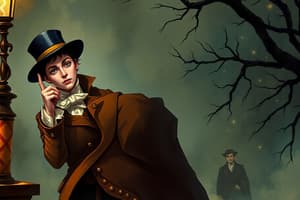Podcast
Questions and Answers
Where was Oliver Twist born?
Where was Oliver Twist born?
In a workhouse.
What did the doctor say about Oliver's mother?
What did the doctor say about Oliver's mother?
She is dead.
What name does Mr. Bumble give to the baby?
What name does Mr. Bumble give to the baby?
Oliver Twist.
What were the boys at the workhouse fed?
What were the boys at the workhouse fed?
Oliver was a chubby child.
Oliver was a chubby child.
The boys decided that one boy would walk up to the master after supper and ask for more ___.
The boys decided that one boy would walk up to the master after supper and ask for more ___.
How did the boys clean their bowls?
How did the boys clean their bowls?
What was the name of the house for poor people?
What was the name of the house for poor people?
Where was Oliver Twist born?
Where was Oliver Twist born?
Who asked to see the child?
Who asked to see the child?
Oliver's mother was married when he was born.
Oliver's mother was married when he was born.
What name did Mr. Bumble invent for the baby?
What name did Mr. Bumble invent for the baby?
How many meals were Oliver and the other boys given each day?
How many meals were Oliver and the other boys given each day?
What was served at the workhouse during meals?
What was served at the workhouse during meals?
Who served the soup to the boys?
Who served the soup to the boys?
What did Oliver ask the master for?
What did Oliver ask the master for?
Flashcards are hidden until you start studying
Study Notes
Oliver's Birth and Early Life
- Oliver Twist was born in a workhouse, a place for the poor in England.
- His mother died shortly after giving birth, leaving him an orphan.
- An old woman and a doctor witnessed the birth; the doctor noted Oliver's mother was young and unmarried.
- The old woman dressed Oliver in clothes used for other babies from the workhouse.
Life in the Workhouse
- At nine years old, Oliver was characterized as pale and thin.
- Workhouse boys endured inadequate clothing and limited food.
- They received only three meals of thin soup daily and a small piece of bread on Sundays.
- Feeding took place in a large hall, with boys eating from bowls that were cleaned with spoons.
The Incident with the Master
- One day, the boys conspired to ask for more soup after supper.
- Oliver was designated to approach the master and request additional food.
- He bravely asked the master, "Please, sir, I want some more," highlighting his desperation and courage in a dire situation.
- This act was a significant moment indicating Oliver's desire for better treatment and his struggle against adversity.
Oliver's Birth and Early Life
- Oliver Twist was born in a workhouse, a place for the poor in England.
- His mother died shortly after giving birth, leaving him an orphan.
- An old woman and a doctor witnessed the birth; the doctor noted Oliver's mother was young and unmarried.
- The old woman dressed Oliver in clothes used for other babies from the workhouse.
Life in the Workhouse
- At nine years old, Oliver was characterized as pale and thin.
- Workhouse boys endured inadequate clothing and limited food.
- They received only three meals of thin soup daily and a small piece of bread on Sundays.
- Feeding took place in a large hall, with boys eating from bowls that were cleaned with spoons.
The Incident with the Master
- One day, the boys conspired to ask for more soup after supper.
- Oliver was designated to approach the master and request additional food.
- He bravely asked the master, "Please, sir, I want some more," highlighting his desperation and courage in a dire situation.
- This act was a significant moment indicating Oliver's desire for better treatment and his struggle against adversity.
Studying That Suits You
Use AI to generate personalized quizzes and flashcards to suit your learning preferences.




